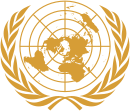
Back حق النقض في مجلس الأمن التابع للأمم المتحدة Arabic Poder de vetu del Conseyu de Seguridá de les Naciones Xuníes AST Poder de veto al Consell de Seguretat de les Nacions Unides Catalan UNO-Vetomacht German Poder de veto del Consejo de Seguridad de las Naciones Unidas Spanish Nazio Batuen Segurtasun Kontseiluaren beto eskubidea Basque حق وتو در شورای امنیت سازمان ملل متحد Persian Droit de veto au Conseil de sécurité des Nations unies French זכות הווטו במועצת הביטחון של האו"ם HE ՄԱԿ-ի Անվտանգության Խորհրդի վետոյի իրավունք Armenian

| Part of a series on the |
| UN Security Council resolutions |
|---|
 |
| Permanent members |
|
|
| Resolutions 1 to 1000 |
| Resolutions 1001 to 2000 |
| Resolutions 2001 to 3000 |
| Resolutions by topic |
| Vetoed resolutions |
The United Nations Security Council veto power is the power of the five permanent members of the UN Security Council (China, France, Russia, the United Kingdom, and the United States) to veto any "substantive" resolution. They also happen to be the nuclear-weapon states (NWS) under the terms of the Treaty on the Non-Proliferation of Nuclear Weapons. However, a permanent member's abstention or absence does not prevent a draft resolution from being adopted.[1] This veto power does not apply to "procedural" votes, as determined by the permanent members themselves. A permanent member can also block the selection of a Secretary-General, although a formal veto is unnecessary since the vote is taken behind closed doors.
The veto power is controversial. Supporters regard it as a promoter of international stability,[2] a check against military interventions,[3] and a critical safeguard against United States domination.[4] Critics say that the veto is the most undemocratic element of the UN,[5] as well as the main cause of inaction on war crimes and crimes against humanity, as it effectively prevents UN action against the permanent members and their allies.[6]
- ^ Engelhardt, Hanns (1963). "Das Vetorecht im Sicherheitsrat der Vereinten Nationen". Archiv des Völkerrechts. 10 (4): 377–415. ISSN 0003-892X. JSTOR 40796759.
- ^ Putin, Vladimir V. (11 September 2013). "What Putin Has to Say to Americans About Syria". The New York Times. Archived from the original on 9 December 2020. Retrieved 28 January 2018.
The United Nations' founders understood that decisions affecting war and peace should happen only by consensus, and with America's consent the veto by Security Council permanent members was enshrined in the United Nations Charter. The profound wisdom of this has underpinned the stability of international relations for decades.
- ^ "Wang Yi: China Is Participant, Facilitator and Contributor of International Order". Consulate-General of the People's Republic of China in Los Angeles. 27 June 2015. Archived from the original on 9 August 2020. Retrieved 11 December 2017.
China's veto at the Security Council has always played an important role in checking the instinct of war and resisting power politics.
- ^ Prashad, Vijay (2020). Washington Bullets. New York: Monthly Review Press. pp. 37–38. ISBN 978-1-58367-906-7.
- ^ Cite error: The named reference
wilcox1945was invoked but never defined (see the help page). - ^ Oliphant, Roland (4 October 2016). "'End Security Council veto' to halt Syria violence, UN human rights chief says amid deadlock". The Telegraph. Archived from the original on 12 January 2022.
© MMXXIII Rich X Search. We shall prevail. All rights reserved. Rich X Search